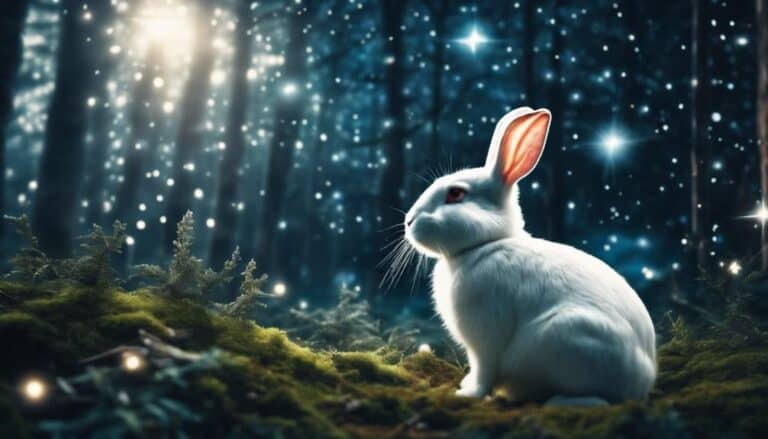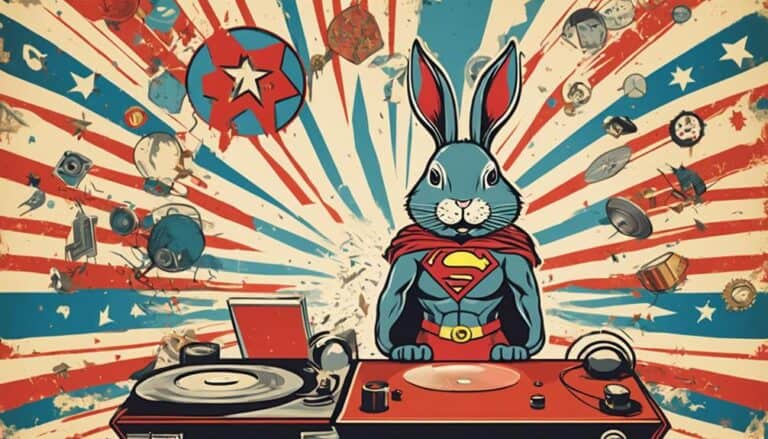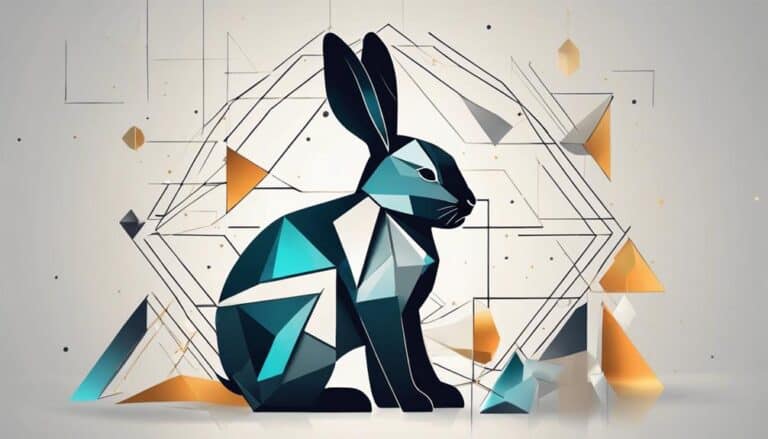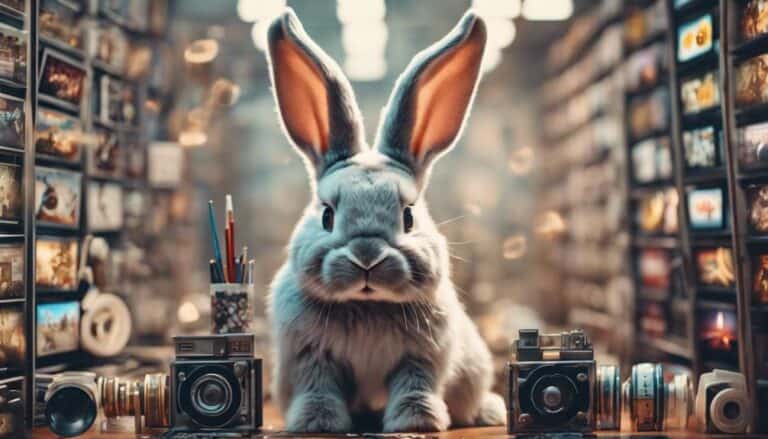Have you ever pondered the mysterious connections between rabbits and ancient European folklore?
The symbolism of these enchanting creatures transcends mere tales, weaving a tapestry of meanings that span centuries.
From their representation of femininity and fertility to their ties to lunar cycles and goddess worship, rabbits hold a profound significance in European cultural narratives.
But what deeper truths lie beneath the surface of these whimsical stories, waiting to be unearthed and explored further?
Contents
- 1 Key Takeaways
- 2 Bunny Symbolism in European Fairy Tales
- 3 Folklore and Bunny Symbolism
- 4 Cultural Significance of Bunnies
- 5 European Folklore Bunny Symbolism
- 6 Rabbit Symbolism in European Stories
- 7 Bunny Symbolism Across Europe
- 8 European Tales: Bunny Symbolism
- 9 Significance of Rabbits in European Folklore
- 10 Frequently Asked Questions
- 11 Conclusion
Key Takeaways
- Bunnies symbolize fertility, abundance, and renewal in European folklore.
- They embody themes of new life, spring, and luck.
- Bunnies represent growth, transformation, and prosperity.
- Their symbolism in folklore reflects adaptability, survival, and cleverness.
Bunny Symbolism in European Fairy Tales

Portrayed as clever and resourceful characters in European fairy tales, rabbits embody qualities of wit and cunning, symbolizing fertility, abundance, and prosperity in the folklore. In European stories, the rabbit symbolizes more than just a cute, fluffy creature; it represents deeper cultural beliefs and values.
Through their portrayal in folklore, rabbits serve as symbols of adaptability and survival, showcasing their ability to overcome challenges with intelligence and quick thinking. The bunny symbolism in European fairy tales adds layers of meaning to the stories, as these creatures navigate magical worlds and encounter fantastical beings, reflecting themes of transformation and growth.
Folklore and Bunny Symbolism
In European folklore, the symbolism surrounding bunnies encompasses themes of luck, fertility, and abundance, reflecting deeper cultural beliefs and values. Rabbits are often linked to the moon goddess, symbolizing fertility, rebirth, and the cycles of the moon.
The association between rabbits and the moon goddess highlights the interconnectedness of nature, femininity, and the rhythms of life. In European traditions, bunnies represent the cyclical nature of existence, embodying themes of renewal, growth, and transformation.
Through folklore tales, rabbits are portrayed as clever, resourceful, and quick-witted creatures, embodying qualities that are admired and revered in many cultures. The presence of bunny symbolism in rituals, celebrations, and superstitions further underscores the significance of these creatures in European folklore.
Cultural Significance of Bunnies
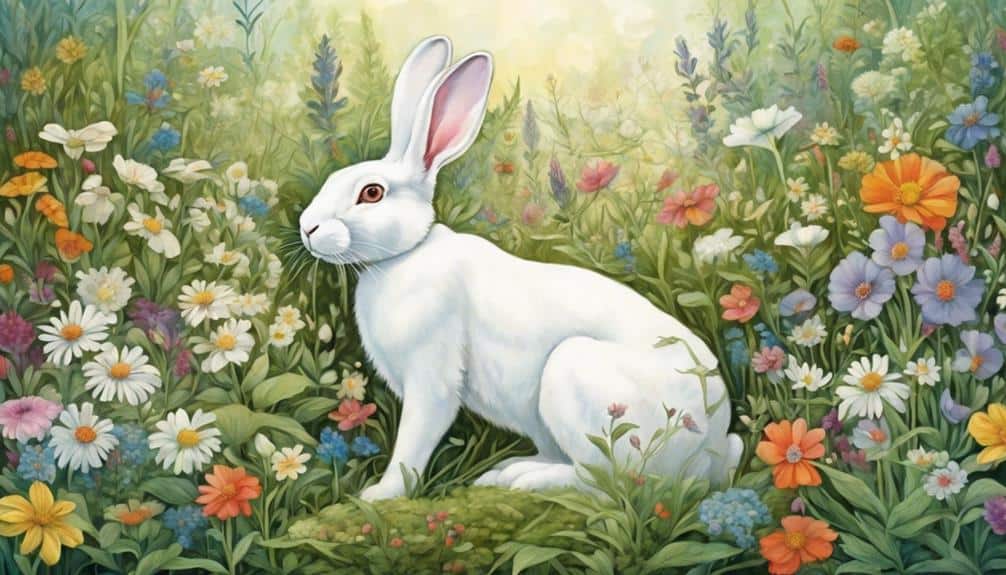
Bunnies hold profound cultural significance in European folklore, embodying themes of fertility, rebirth, and abundance that have resonated for centuries. In European traditions, these creatures are revered as a symbol of new life, particularly associated with the arrival of spring and the renewal of the natural world. Their presence in mythology and folklore underscores the deep-rooted belief in their connection to growth and the cyclical nature of existence. Bunnies are often depicted in art and literature as representations of innocence, playfulness, and magic, further solidifying their symbolic importance in European culture.
Moreover, these enchanting creatures aren't merely seen as cute animals but as messengers of good fortune and luck in many narratives, serving as positive omens for those they encounter. The portrayal of bunnies in European folklore highlights their role as a beacon of hope, prosperity, and the interconnectedness of all living things, making them an enduring symbol of vitality and new beginnings.
European Folklore Bunny Symbolism
The significance of rabbits in European folklore extends beyond mere representation of cute animals, encompassing profound symbolism intertwined with themes of fertility, abundance, and renewal. In European folklore, bunnies are deeply embedded in cultural narratives, serving as potent symbols of various concepts:
- Fertility: Rabbits are often seen as symbols of fertility in European folklore, representing the ability to bring forth new life and abundance in nature. Their prolific breeding habits align with the idea of fertility and growth.
- Renewal: Bunnies in European legends are associated with renewal, spring, and new beginnings. Their presence signifies the cyclical nature of life, where old gives way to the new, and opportunities for growth and transformation abound.
- Luck: Within European folklore, the bunny's presence symbolizes luck, prosperity, and growth. Their portrayal as magical creatures tied to the cycles of life suggests that encountering a rabbit can bring good fortune and positive outcomes in various endeavors.
Rabbit Symbolism in European Stories
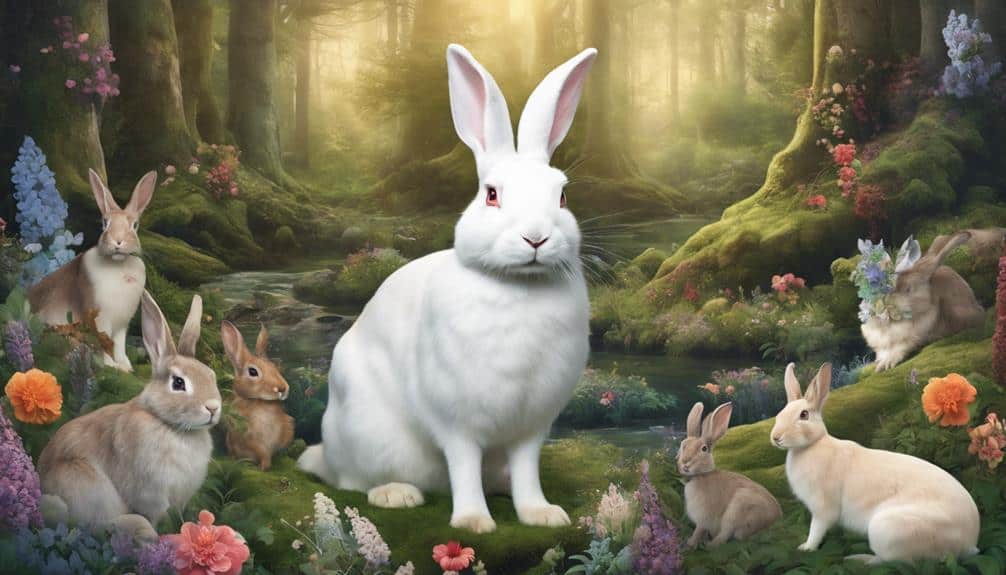
In European stories, rabbits play dynamic roles symbolizing cunning, quickness, and cleverness. They're often depicted as tricksters, outwitting adversaries through their sharp wit.
These tales link rabbits to themes of fertility, abundance, and prosperity, emphasizing their resilience and adaptability in handling challenges.
Folklore Rabbit Meanings
Symbolizing cunning, fertility, and transformation, rabbits in European folklore are revered as wise creatures with magical powers, known for outsmarting larger animals and humans. In European stories, these enchanting creatures hold significant meanings:
- Tricksters: Rabbits are often portrayed as clever tricksters who use their intelligence to outwit their adversaries.
- Magical Powers: European folklore attributes magical abilities to rabbits, such as shape-shifting or invisibility, enhancing their mystical aura.
- Symbolism of Luck: In European cultures, rabbits are seen as symbols of luck, abundance, and protection, bringing positive energies to those they encounter.
Through these rich symbols and meanings, rabbits in European folklore captivate the imagination and offer valuable lessons on wit, magic, and fortune.
European Rabbit Tales
With a focus on European Rabbit Tales, explore the enchanting stories that showcase rabbits as cunning and resourceful figures in the rich tapestry of European folklore.
European rabbit tales depict these creatures as clever beings who use their intelligence to overcome challenges and outwit their foes. In European folklore, rabbits symbolize traits such as bravery, quick thinking, and adaptability, making them beloved characters in various narratives.
Often portrayed as tricksters who rely on their wit to navigate tricky situations, rabbits in European stories embody the enduring popularity and diverse interpretations of these creatures in European cultures. Through their resourcefulness and ingenuity, rabbits in European folklore teach valuable lessons about resilience and the power of intelligence in overcoming obstacles.
Bunny Symbolism Across Europe
Explore the rich tapestry of European rabbit symbolism, where bunnies are intertwined with themes of fertility, rebirth, and agility across various cultures.
Discover the German Easter Bunny, a cherished icon symbolizing the joy of Easter festivities with its colorful egg deliveries.
Reveal Celtic myths that depict rabbits as celestial creatures tied to the moon, embodying themes of transformation and fresh beginnings.
European Rabbit Folklore
In European folklore, the symbolism of rabbits transcends mere animals, embodying themes of cunning, magic, and transformation across diverse regions.
- Fertility and Rebirth: Rabbits symbolize fertility, abundance, and rebirth in European cultures, representing the cycle of life and the renewal of nature.
- Easter Bunny Origins: The Easter Bunny tradition, rooted in European folklore, particularly Germanic and Celtic beliefs, showcases rabbits as harbingers of spring, symbolizing new beginnings and the celebration of life.
- Luck and Prosperity: European folklore often portrays rabbits as bringers of luck, prosperity, and the changing seasons, emphasizing their connection to positive outcomes and the bountiful harvests that come with the shifting of the seasons.
Cultural Rabbit Representations
Cultural Rabbit Representations in European folklore reveal a tapestry of symbolism intertwining fertility, abundance, and new beginnings across diverse regions.
The association of rabbits with the moon highlights their connection to fertility and the cycles of nature in European folklore.
The Easter Bunny, originating in Germany and spreading across Europe, symbolizes the arrival of spring and the renewal of life.
Different adaptations of the Easter Bunny myth in various European countries reflect unique local traditions and beliefs, showcasing the cultural diversity of bunny representations.
Rabbits are deeply embedded in European cultures as symbols of joy, hope, and the promise of warmer seasons, embodying the enduring popularity and positive connotations attributed to these beloved creatures in folklore.
Symbolic Bunny Meanings
Rabbit symbolism in European folklore extends beyond mere representation, showcasing a rich tapestry of meanings that encompass fertility, abundance, and new beginnings across diverse regions.
- Bunnies are seen as a symbol of fertility, representing the cycle of life and the promise of new beginnings in the spring.
- In ancient pagan traditions, bunnies were revered for their connection to the changing seasons, embodying the rebirth of nature.
- Across European cultures, bunnies symbolize abundance and growth, serving as messengers of good fortune and luck. Their presence in folklore highlights themes of renewal, prosperity, and the interconnectedness of life with the natural world.
European Tales: Bunny Symbolism
Within European folklore, the tales of bunny symbolism intricately weave together themes of fertility, magic, and the everlasting cycle of life. Rabbits symbolize new beginnings, growth, and the cyclical nature of existence.
In European folklore, the rabbit is often associated with the goddess of spring, symbolizing the renewal and rejuvenation of the earth. These tales depict rabbits as magical creatures capable of bringing luck and prosperity to those they encounter.
The cycle of life is represented through stories where rabbits navigate challenges with cleverness and resourcefulness, showcasing their adaptability and resilience. Through their portrayal in European traditions, rabbits embody innocence, agility, and the interconnectedness of all living beings.
The presence of rabbits in folklore serves as a reminder of the ever-changing seasons, the continuous cycle of birth and rebirth, and the enduring magic found in the natural world.
Significance of Rabbits in European Folklore
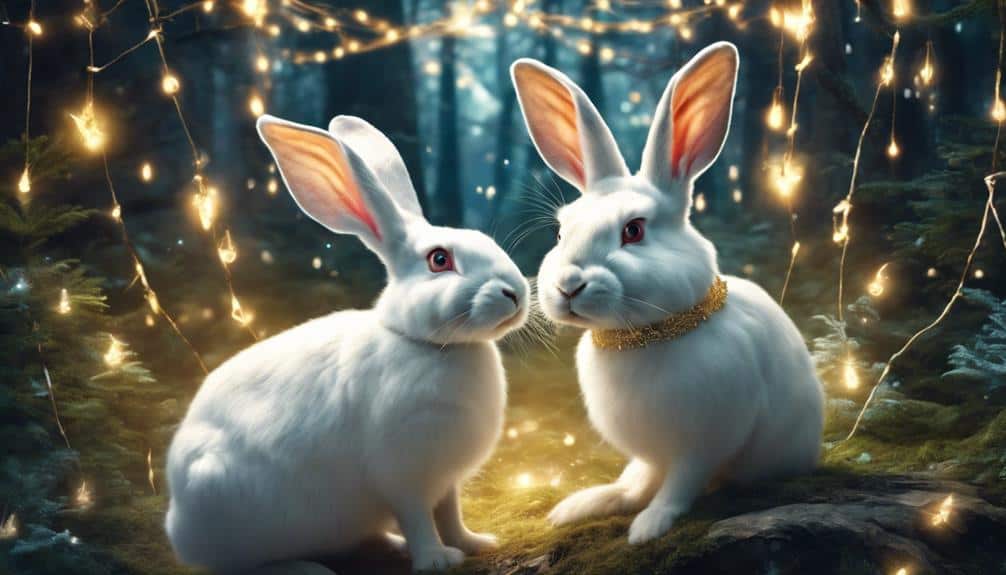
Exploring the symbolism of rabbits in European folklore reveals intricate connections with themes of fertility, abundance, and transformation. These creatures have been integral to European tales for centuries, embodying profound meanings that resonate with the human experience.
- Life and Fertility: Rabbits are deeply associated with the cycle of life and fertility in ancient European folklore. Their prolific breeding habits symbolize the abundance of nature and the renewal of life each spring.
- Ancient Beliefs: In European traditions, rabbits are often linked to ancient beliefs and customs surrounding the changing seasons. They serve as harbingers of spring, signaling a time of growth and rejuvenation.
- The Three Hares: The motif of the Three Hares, where three hares are depicted in a circular formation sharing three ears, is an enigmatic symbol found in European folklore. This motif is associated with themes of interconnectedness, unity, and the cyclical nature of life.
Frequently Asked Questions
What Does the European Rabbit Symbolize?
The European rabbit symbolizes fertility, luck, and prosperity. In trickster tales, it embodies cunning and adaptability. Moon connections highlight its mystical allure. Embrace the balance between vulnerability and strength that these enchanting creatures embody in European folklore.
What Is the Folklore of the European Rabbit?
In European folklore, the rabbit embodies symbolic meanings of fertility, agility, and luck. Its cultural significance lies in representing renewal and the changing seasons. Mythical connections depict rabbits as clever tricksters with magical powers, echoing folk beliefs in their protective qualities.
What Do Rabbits Symbolize in Folklore?
In folklore, rabbits symbolize magical creatures embodying fertility, abundance, and rebirth. Their symbolism intertwines with superstitions and cultural beliefs, reflecting luck, prosperity, and cunning. Embracing the cycle of life, they inspire new beginnings.
What Does Rabbit Mean in Norse Mythology?
In Norse mythology, rabbits hold significance as cunning creatures associated with the trickster god Loki. They symbolize agility, resourcefulness, and transformation. Norse legends depict rabbits as clever beings embodying adaptability and mischievous traits.
Conclusion
As you reflect on the enchanting rabbit symbolism woven throughout European folklore, you're transported to a land where bunnies embody femininity, fertility, and rebirth.
Their significance transcends time, resonating with themes of love, abundance, and transformation.
Despite the shift from sacred to sinister connotations in Christian narratives, rabbits remain emblematic of lunar cycles, fertility, and goddesses in cultural traditions.
The timeless allure of these creatures persists, creating a tapestry of symbolism that's both mesmerizing and enduring.


